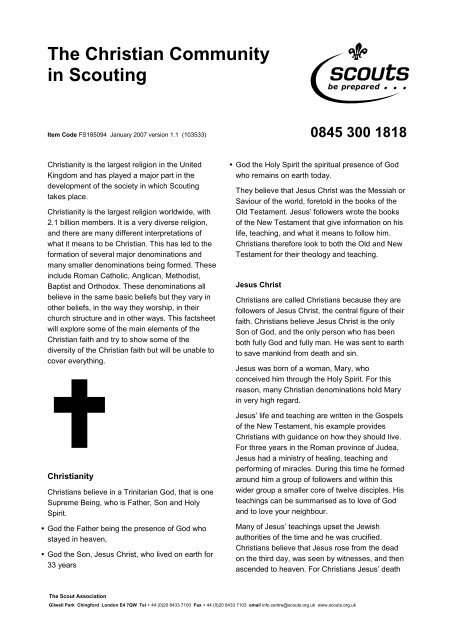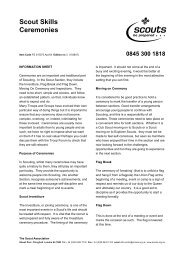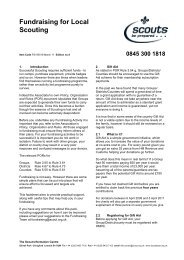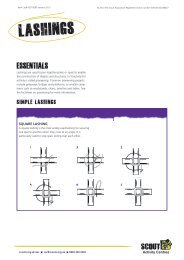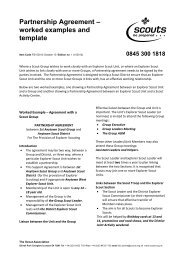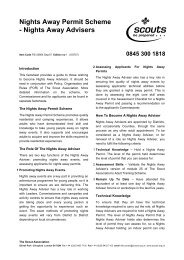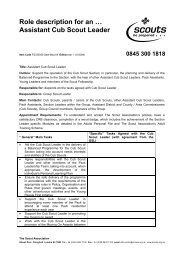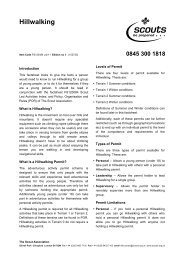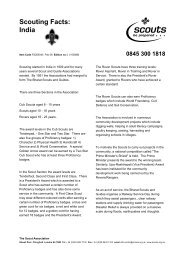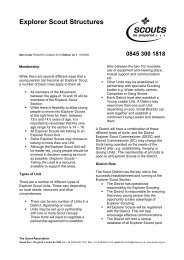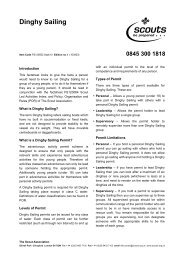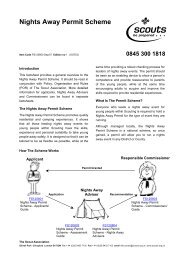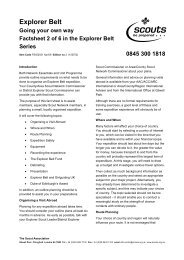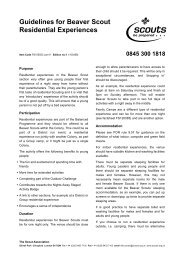The Christian Community in Scouting - ScoutBase UK
The Christian Community in Scouting - ScoutBase UK
The Christian Community in Scouting - ScoutBase UK
Create successful ePaper yourself
Turn your PDF publications into a flip-book with our unique Google optimized e-Paper software.
<strong>The</strong> <strong>Christian</strong> <strong>Community</strong><strong>in</strong> Scout<strong>in</strong>gSItem Code FS185094 January 2007 version 1.1 (103533) 0845 300 1818<strong>Christian</strong>ity is the largest religion <strong>in</strong> the UnitedK<strong>in</strong>gdom and has played a major part <strong>in</strong> thedevelopment of the society <strong>in</strong> which Scout<strong>in</strong>gtakes place.<strong>Christian</strong>ity is the largest religion worldwide, with2.1 billion members. It is a very diverse religion,and there are many different <strong>in</strong>terpretations ofwhat it means to be <strong>Christian</strong>. This has led to theformation of several major denom<strong>in</strong>ations andmany smaller denom<strong>in</strong>ations be<strong>in</strong>g formed. <strong>The</strong>se<strong>in</strong>clude Roman Catholic, Anglican, Methodist,Baptist and Orthodox. <strong>The</strong>se denom<strong>in</strong>ations allbelieve <strong>in</strong> the same basic beliefs but they vary <strong>in</strong>other beliefs, <strong>in</strong> the way they worship, <strong>in</strong> theirchurch structure and <strong>in</strong> other ways. This factsheetwill explore some of the ma<strong>in</strong> elements of the<strong>Christian</strong> faith and try to show some of thediversity of the <strong>Christian</strong> faith but will be unable tocover everyth<strong>in</strong>g.<strong>Christian</strong>ity<strong>Christian</strong>s believe <strong>in</strong> a Tr<strong>in</strong>itarian God, that is oneSupreme Be<strong>in</strong>g, who is Father, Son and HolySpirit.• God the Father be<strong>in</strong>g the presence of God whostayed <strong>in</strong> heaven,• God the Son, Jesus Christ, who lived on earth for33 years• God the Holy Spirit the spiritual presence of Godwho rema<strong>in</strong>s on earth today.<strong>The</strong>y believe that Jesus Christ was the Messiah orSaviour of the world, foretold <strong>in</strong> the books of theOld Testament. Jesus’ followers wrote the booksof the New Testament that give <strong>in</strong>formation on hislife, teach<strong>in</strong>g, and what it means to follow him.<strong>Christian</strong>s therefore look to both the Old and NewTestament for their theology and teach<strong>in</strong>g.Jesus Christ<strong>Christian</strong>s are called <strong>Christian</strong>s because they arefollowers of Jesus Christ, the central figure of theirfaith. <strong>Christian</strong>s believe Jesus Christ is the onlySon of God, and the only person who has beenboth fully God and fully man. He was sent to earthto save mank<strong>in</strong>d from death and s<strong>in</strong>.Jesus was born of a woman, Mary, whoconceived him through the Holy Spirit. For thisreason, many <strong>Christian</strong> denom<strong>in</strong>ations hold Mary<strong>in</strong> very high regard.Jesus’ life and teach<strong>in</strong>g are written <strong>in</strong> the Gospelsof the New Testament, his example provides<strong>Christian</strong>s with guidance on how they should live.For three years <strong>in</strong> the Roman prov<strong>in</strong>ce of Judea,Jesus had a m<strong>in</strong>istry of heal<strong>in</strong>g, teach<strong>in</strong>g andperform<strong>in</strong>g of miracles. Dur<strong>in</strong>g this time he formedaround him a group of followers and with<strong>in</strong> thiswider group a smaller core of twelve disciples. Histeach<strong>in</strong>gs can be summarised as to love of Godand to love your neighbour.Many of Jesus’ teach<strong>in</strong>gs upset the Jewishauthorities of the time and he was crucified.<strong>Christian</strong>s believe that Jesus rose from the deadon the third day, was seen by witnesses, and thenascended to heaven. For <strong>Christian</strong>s Jesus’ death<strong>The</strong> Scout AssociationGilwell Park Ch<strong>in</strong>gford London E4 7QW Tel + 44 (0)20 8433 7100 Fax + 44 (0)20 8433 7103 email <strong>in</strong>fo.centre@scouts.org.uk www.scouts.org.uk
page 2 of 5was seen as a sacrifice for the s<strong>in</strong>s of the world,and forms a central part of their faith. <strong>The</strong>y believethat his resurrection is a promise that they too willrise from the dead.<strong>The</strong> twelve disciples were <strong>in</strong>spired by the HolySpirit and started to spread Jesus’ teach<strong>in</strong>gs.Jesus and his followers were Jewish, but<strong>Christian</strong>ity soon began to develop as a separatereligion.<strong>The</strong> Holy Book – <strong>The</strong> Bible<strong>Christian</strong>s believe that the Bible is the directrevelation of God, written by men directly <strong>in</strong>spiredby the Holy Spirit. It conta<strong>in</strong>s a record of God’sactions <strong>in</strong> history, God’s commands on how<strong>Christian</strong>s should live their life, and the life ofJesus. <strong>The</strong> Bible consists of two sectionsbooks,<strong>The</strong> Old Testament and the New Testament. <strong>The</strong>Old Testament conta<strong>in</strong>s the story of the people ofIsrael before the time of Jesus. <strong>The</strong> NewTestament conta<strong>in</strong>s the story of Jesus and thedevelopment of the early church. Each Testamentconsists of a series of books that conta<strong>in</strong> stories,songs, poetry, letters, history, and religiouswrit<strong>in</strong>g.<strong>The</strong>re have always been differences <strong>in</strong> the<strong>in</strong>terpretation of the Bible by <strong>Christian</strong>s. Somebelieve that the words of the Bible are true <strong>in</strong> theliteral sense, whilst others consider the Bible to beessentially symbolic with profound spiritual<strong>in</strong>sights.Worship and Prayer<strong>Christian</strong> worship <strong>in</strong>volves prais<strong>in</strong>g God throughmusic and speech, us<strong>in</strong>g read<strong>in</strong>gs from scripture,prayers, sermons and ceremonies (sometimescalled sacraments).Traditionally the ma<strong>in</strong> day of worship for<strong>Christian</strong>s is Sunday: the first day of creation andthe day on which Jesus rose from the dead. Thisis the day when <strong>Christian</strong>s gather together for thema<strong>in</strong> act of worship.Worship will usually be at a designated churchbuild<strong>in</strong>g, but can be at any venue. In the <strong>UK</strong>,church build<strong>in</strong>gs are often the oldest build<strong>in</strong>gs <strong>in</strong> acommunity, but they can also be more modern.<strong>The</strong>re are differences <strong>in</strong> the style and emphasis ofthe ma<strong>in</strong> act of worship between differentdenom<strong>in</strong>ations:• For some denom<strong>in</strong>ations the ma<strong>in</strong> act of worshipwill be a service of Holy Communion, which reenactsthe last meal that Jesus shared with hisdisciples.• At some churches the central act of worship willbe bible read<strong>in</strong>gs and the <strong>in</strong>terpretation of them.<strong>The</strong>re are some denom<strong>in</strong>ations andcongregations with<strong>in</strong> the <strong>Christian</strong> church whohave experimented <strong>in</strong> new ways of worshipp<strong>in</strong>gthat use different venues to churches, along withhigh tech light<strong>in</strong>g and music.• Other smaller acts of worship, social activities,and teach<strong>in</strong>g times will be held dur<strong>in</strong>g the week,either at the church build<strong>in</strong>g or <strong>in</strong> peoples homes.<strong>The</strong> SacramentsMost <strong>Christian</strong> denom<strong>in</strong>ations believe <strong>in</strong>sacraments. <strong>The</strong>se can be described as the mostholy or special th<strong>in</strong>gs that the church can offer tobelievers. Not all churches have the same numberof sacraments, and some give different value andimportance to them. In all the sacraments thepresence of the Holy Spirit and his work<strong>in</strong>g is ofkey importance. <strong>The</strong>re are seven sacraments thatare recognised to a different degree by manydenom<strong>in</strong>ations.• BaptismBaptism is the most widely accepted means ofentry <strong>in</strong>to the <strong>Christian</strong> faith. This may happen asa baby or as an adult. <strong>The</strong> service is full ofsymbolism and conta<strong>in</strong>s the pour<strong>in</strong>g out orimmersion <strong>in</strong>to water.Key symbols with<strong>in</strong> this service is darkness andlight, unclean and clean, old life and new life. <strong>The</strong>parents of a baby who is to be baptised willchoose Godparents who act as advisers for thebaby as they grow up with<strong>in</strong> the church. <strong>The</strong>
page 3 of 5parents and Godparents speak for the baby at theservice and commit the baby to the <strong>Christian</strong>church.In some <strong>Christian</strong> denom<strong>in</strong>ations Baptism isconsidered to be such an important sacramentthat it is only offered to adults who can expresstheir faith for themselves.• Holy CommunionHoly Communion is the service where bread andw<strong>in</strong>e are consecrated and shared by theCongregation. This sacrament re-enacts the lastmeal, the Last Supper, that Jesus shared with hisdisciples. Some <strong>Christian</strong>s see this is a simple reenactmentof the Last Supper, whereas for othersthe bread and w<strong>in</strong>e symbolically represent thebody and blood of Christ, and others believe thatthe bread and w<strong>in</strong>e become the real body andblood of Jesus Christ.<strong>The</strong> beliefs surround<strong>in</strong>g Holy Communion will varybetween denom<strong>in</strong>ations and even with<strong>in</strong> them.<strong>The</strong> Holy Communion itself can be referred to byseveral titles these <strong>in</strong>clude mass, Eucharist, theDiv<strong>in</strong>e Liturgy and the Lords supper• ConfirmationThis is a service <strong>in</strong> which a baptised child or adultconfirms their faith <strong>in</strong> Christ. It is also a sign of fullmembership of the <strong>Christian</strong> community. Throughconfirmation, a <strong>Christian</strong> believes that they arereceiv<strong>in</strong>g the gift of the Holy Spirit.In Eastern churches, <strong>in</strong>fants are confirmed afterbaptism, most Western denom<strong>in</strong>ations wait untilparticipants are old enough to understand whatthey are undertak<strong>in</strong>g. <strong>The</strong>re are variations <strong>in</strong> theway the service is be<strong>in</strong>g carried out betweendenom<strong>in</strong>ations. Confirmation candidates attendclasses to help them have a better understand<strong>in</strong>gof how to live as a follower of Christ.commissioned either by ord<strong>in</strong>ation or a similarmethod, which is considered a sacrament.Perform<strong>in</strong>g this leadership role is often known asm<strong>in</strong>istry, and seen as the cont<strong>in</strong>uation of the workof Jesus Christ. M<strong>in</strong>istry can take many differentforms, both with<strong>in</strong> and between denom<strong>in</strong>ations.<strong>The</strong>re are also variations <strong>in</strong> who is able performdifferent types of m<strong>in</strong>istry. In some denom<strong>in</strong>ations,only someone who has been orda<strong>in</strong>ed can usuallyadm<strong>in</strong>ister the sacraments.• Marriage<strong>Christian</strong>s believe that marriage is a gift from God,that shouldn’t be taken lightly. <strong>The</strong>y considermarriage to be a lifelong commitment, andimportant for the love of the couple themselvesand the procreation and upbr<strong>in</strong>g<strong>in</strong>g of children.Gett<strong>in</strong>g married <strong>in</strong> a church <strong>in</strong> front of God is veryimportant, and some denom<strong>in</strong>ations see marriageas a sacrament. Dur<strong>in</strong>g the service of marriagethe couple will make vows to each other withfamily, friends and God as their witnesses.• Reconciliation<strong>Christian</strong>s believe that only God is perfect. Asimperfect be<strong>in</strong>gs we often do th<strong>in</strong>gs of which weare ashamed and that go aga<strong>in</strong>st the teach<strong>in</strong>gs ofJesus. <strong>The</strong>re are many forms of formal confessionor say<strong>in</strong>g sorry to God for these faults or s<strong>in</strong>s.God’s forgiveness comes through the absolutionthat normally comes from a <strong>Christian</strong> m<strong>in</strong>ister.This symbolises the forgiveness that comes fromGod.• Heal<strong>in</strong>g<strong>The</strong> Bible teaches that Jesus Christ performedmany miracles, <strong>in</strong>clud<strong>in</strong>g those of heal<strong>in</strong>g. Some<strong>Christian</strong>s believe that this heal<strong>in</strong>g cont<strong>in</strong>uesthrough the power of the Holy Spirit, and can beperformed as a sacrament.• Ord<strong>in</strong>ationIn some <strong>Christian</strong> denom<strong>in</strong>ations the leaders ofthe church are officially recognised and
page 4 of 5Holy Days and festivals<strong>The</strong> two major celebrations for the <strong>Christian</strong>church are Christmas and Easter. Christmas is onthe same day every year and Easter movesaround. <strong>The</strong> actual date for Christmas and Eastercan be different between different denom<strong>in</strong>ationsof <strong>Christian</strong>ity. Some other festivals are based onthe date of Easter, so their dates will move aroundas well.<strong>The</strong> <strong>Christian</strong> church year is divided <strong>in</strong>to seasons.<strong>The</strong> year beg<strong>in</strong>s on the fourth Sunday beforeChristmas with Advent. <strong>The</strong> major seasons areoften <strong>in</strong>dicated by the use of colour and theword<strong>in</strong>g of services. Denom<strong>in</strong>ations will vary <strong>in</strong>their recognition of other seasonal times andcelebrations. <strong>The</strong> church year is as follows:• Advent. A time of preparation before Christmas.Seasonal colour of purple. Symbolism of darknessand light.• Christmas Day, Epiphany and Christmastide.<strong>The</strong> celebration of the birth of Christ. Seasonalcolour white.• Lent. <strong>The</strong> 40 days lead<strong>in</strong>g up to Easter, beg<strong>in</strong>n<strong>in</strong>gon Ash Wednesday. It is a time of penitence andcan <strong>in</strong>clude ritual fast<strong>in</strong>g. Seasonal colour purple.• Easter, Eastertide, Pentecost (Whitsun) <strong>The</strong>most important <strong>Christian</strong> festival, it is thecelebration of the resurrection of Jesus. Seasonalcolour white.<strong>Christian</strong>s may also celebrate Sa<strong>in</strong>ts days. Sa<strong>in</strong>tsare men and women whom the church believes tohave led particularly holy lives and have shown agood example of <strong>Christian</strong> liv<strong>in</strong>g. Several Sa<strong>in</strong>tsdays are associated with particular customs andcelebrations. Some <strong>Christian</strong>s may celebrate thename day of the sa<strong>in</strong>t that shares their name.Some churches do not recognise special holidays,and may also discourage the celebration of Easterand Christmas.Behaviour and Values<strong>The</strong> behaviour and values of <strong>Christian</strong>s are basedon the Ten Commandments of the Old Testamentand the teach<strong>in</strong>gs and behaviour of Jesus Christ.<strong>The</strong> teach<strong>in</strong>gs of Jesus are based on the love ofGod and for your fellow human be<strong>in</strong>gs.<strong>The</strong> <strong>Christian</strong> church believes that all humans arefaced with choices <strong>in</strong> life and one of the biggest iswhether to follow the path of good or evil. <strong>The</strong>force of good <strong>in</strong> the world is God and the force ofevil is traditionally referred to as the Devil.Family and <strong>Community</strong><strong>Christian</strong>ity differs from some of the other religions<strong>in</strong> the fact that not all members of a family may be<strong>Christian</strong>s. <strong>Christian</strong>s are encouraged to take theirbeliefs and live them out with<strong>in</strong> their lives.<strong>Christian</strong> families may spend time together <strong>in</strong>prayer dur<strong>in</strong>g the week and give thanks beforeeach meal.<strong>Christian</strong> ScoutsFrom the very early days, the <strong>Christian</strong> faith haswarmly embraced the values and ethos ofScout<strong>in</strong>g. Many of the first Scout Leaders <strong>in</strong> theUnited K<strong>in</strong>gdom were members of the clergy andrespected members of the <strong>Christian</strong> church.As there has been a long history of close l<strong>in</strong>ksbetween <strong>Christian</strong>ity and Scout<strong>in</strong>g <strong>in</strong> the <strong>UK</strong>,many Scouts are <strong>Christian</strong>, and our practises andvalues are often closely l<strong>in</strong>ked.Some <strong>Christian</strong> Scouts will be required to attendan act of <strong>Christian</strong> worship on a Sunday morn<strong>in</strong>g(or another day depend<strong>in</strong>g on their particulardenom<strong>in</strong>ation). This may prevent them from tak<strong>in</strong>gpart <strong>in</strong> Scout activities on that day. Dur<strong>in</strong>g camps,most Scout campsites will be able to offer acontact with local churches <strong>in</strong> the area. <strong>The</strong>campsite may also have a <strong>Christian</strong> m<strong>in</strong>ister as asite chapla<strong>in</strong> who may be available to offerworship on the campsite.Some <strong>Christian</strong> young people will attendconfirmation classes as part of becom<strong>in</strong>g a full
page 5 of 5member of their church. This will happen atdifferent ages depend<strong>in</strong>g upon the <strong>in</strong>dividual andtheir denom<strong>in</strong>ation. This might put extra pressureon their free time outside of school, or clash withtheir weekly Scout meet<strong>in</strong>gs, so Leaders mayneed to be understand<strong>in</strong>g of their commitments,as well as supportive of this important time <strong>in</strong> ayoung <strong>Christian</strong>’s life.<strong>The</strong> majority of <strong>Christian</strong>s are not restricted bydiet, though some will absta<strong>in</strong> from alcohol.Because of the variety of <strong>Christian</strong> beliefs, it isimportant not to make assumptions about what a<strong>Christian</strong> Scout believes, how they celebrate theirfaith, and how be<strong>in</strong>g a <strong>Christian</strong> will impact onthem be<strong>in</strong>g a Scout. If you are unsure whethersometh<strong>in</strong>g is acceptable, ask the <strong>in</strong>dividual, andtheir parents if appropriate.Further <strong>in</strong>formationFurther <strong>in</strong>formation on the <strong>Christian</strong> faith can befound at:www.bbc.co.uk/religion/religions/christianity/


